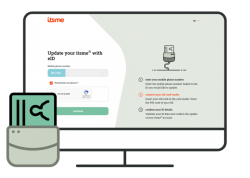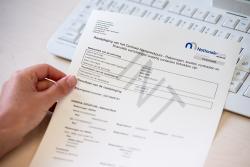Consultation by natural and legal persons ("registered persons")
Anyone can consult free of charge the data pertaining to them stored in the Central Point of Contact for accounts and financial contracts (CPC). The easiest and quickest way to do so is through the web application, although it is also possible to request an overview from the CPC in writing.
Online consultation: the easiest and fastest way!

The easiest and fastest way to consult your data in the CPC is through the web application.
This application can be accessed with itsme® or your electronic identity card (as for Tax-on-web). It is available at all times, with the exception of Sunday mornings from 8:00 to 12:00 and during site maintenance.
NOTE Submitted data are only posted online with a view days’ delay. This goes for both data received from account holders regarding foreign accounts and data from financial institutions and insurance companies regarding Belgian accounts, financial contracts and transactions involving cash. More information on the CPC notification deadlines can be found in the applicable legislation.
Written procedure

The following must be provided:
- a written, dated and signed request to access one’s own data in the CPC database;
- a clearly legible double-sided copy of the identity card (front and back) or, if not available, of a similar document of the person signing the request; for a legal person, their authorised representative must also submit a power of attorney;
- the required identification data:
- for natural persons: full name, date of birth, home address;
- for legal persons: registration number with the Crossroads Bank for Enterprises, company name, corporate form, full address of the registered office.
The request must be sent to:
National Bank of Belgium
Central Point of Contact for accounts and financial contracts (CPC)
14 Boulevard de Berlaimont
1000 Brussels
The National Bank of Belgium will send the consultation results free of charge:
- for natural persons: to the address in the National Register of the natural person (to which the data relate) or, if not available, to the address indicated on the official identity document submitted by the person concerned;
- for legal persons: to the address in the Crossroads Bank for Enterprises of the legal person (to which the data relate) or, if not available, to the authorised representative’s address in the National Register.
The results of a consultation will always contain the following data:
- for domestic accounts, financial contracts and transactions involving cash: all data reported to the CPC and stored in the CPC database (up to 10 years from the date of notification of the closure of the account or termination of the contract).
- for foreign accounts: all accounts reported to the CPC by the resident (or the authorised representative) (up to 10 years from the date of notification of the closure of the foreign account).
Specific situations
You are the guardian of a protected person.
You can consult this person’s data in the CPC database. To do so, you must submit the following:
- the order in full issued by the justice of the peace;
- a double-sided copy of your identity card (front and back);
- a request signed by you.
Please note that the requested data will be sent solely by post to the guardian's legal address.
You are the administrator of the assets of a protected person.
Administrators of the assets of a protected person do not have access to the CPC. To gain access, they must submit a request to the justice of the peace who appointed them.
Justices of the peace are entitled to access the CPC database and can request data relating to a protected person via the online application of the FPS Justice and have these data added to the protection file.
You are an authorised representative who needs to consult the data of the person you represent.
Such consultation is possible upon presentation of the following documents:
- a valid power of attorney (including an express authorisation to consult the CPC database);
- a request signed by the authorised representative;
- a double-sided copy (front and back) of the identity card of the authorised representative and the identity card of the person whose data are to be consulted.
Please note that the data will be sent solely by post to the legal address of the person whose data are requested.
You wish to consult the account(s) of a deceased family member in the context of an inheritance.
In this case, you must contact a notary. Notaries are the sole persons authorised by law to consult the CPC database in the context of inheritance matters.
You are the executor of an unclaimed estate
Executors of unclaimed estates do not have access to the CPC database and must contact a notary. Notaries are the sole persons authorised to consult the CPC database in the context of inheritance matters.
You are a trustee of a bankrupt company
Trustees of bankrupt companies may exercise all managerial powers over the company, including the right to inspect the company’s data in the Central Point of Contact for accounts and financial contracts (CPC). They may access these data upon submission of a double-sided copy (front and back) of their identity card and a copy of the order issued by the court.
Please note that requested data will be sent solely by post to the address of the legal person registered with the Crossroads Bank for Enterprises.
Consulting the list
Any person may consult, upon request, the list of parties entitled to information that have viewed their data in the CPC database over the last six calendar months, unless an exemption from disclosure applies pursuant to Article 23(1) of the General Data Protection Regulation. Persons who wish to exercise this right should send a written, dated and signed request to the CPC.
This procedure is similar to that for the consultation of data by a natural or legal person through the submission of a written request (see above).
